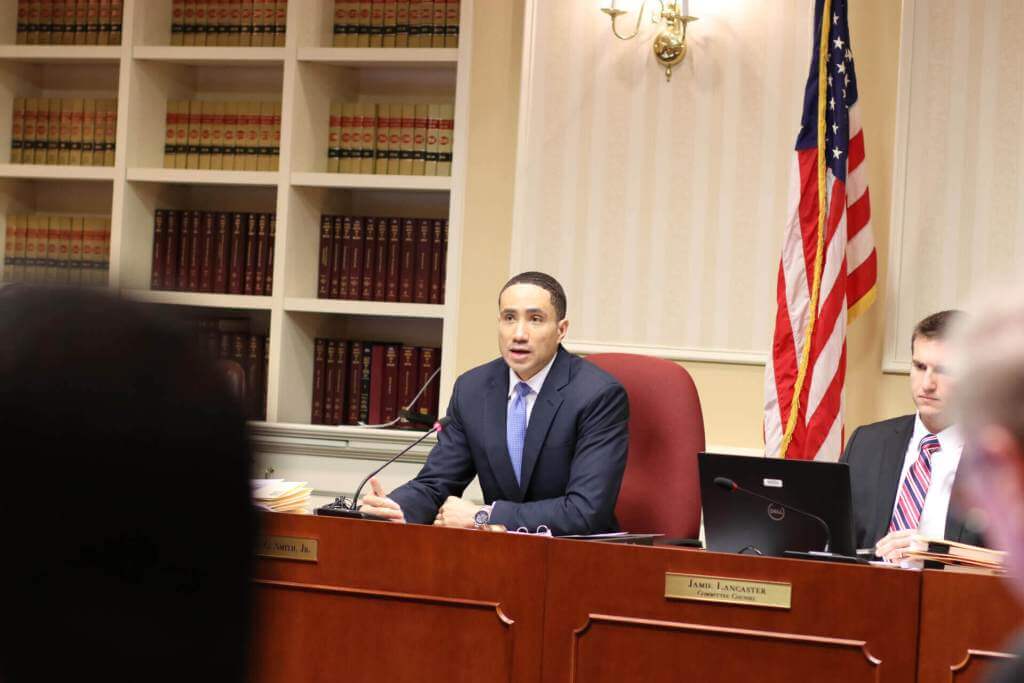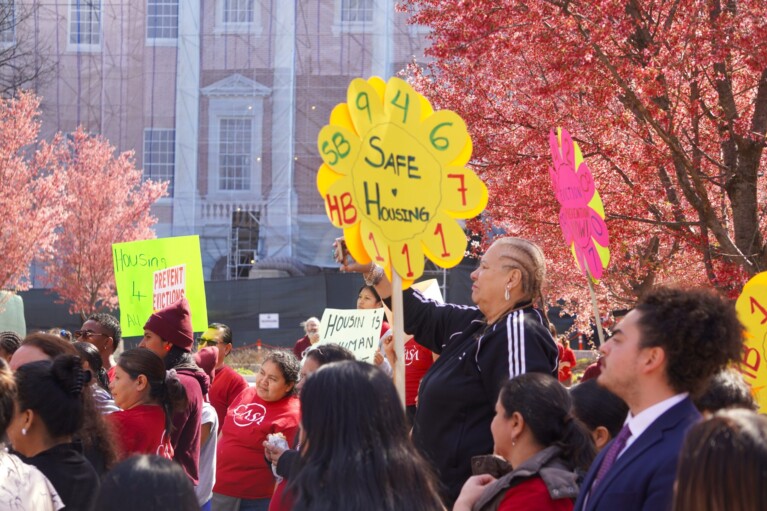Historic Police Reform Package Passes Out of Senate Chamber on Bipartisan Terms

After the final bill in the Senate Judicial Proceedings Committee’s police reform package passed out of the chamber Thursday, Sen. William C. Smith Jr. (D-Montgomery) collected himself after a standing ovation on the chamber floor.
Speaking to his colleagues, Smith reflected on moments of stillness in his life.
“First, when I wake up in the morning, I like to shave,” Smith said. “It’s the first thing I do, and it’s because it’s the only moment of my day that I get a chance to kind of be with myself” ― quiet, contemplative and alone.
“And, invariably, at least once a week I’ll start looking at myself and thinking, ‘Where, where did this come from? Where’s my hair from? My skin? My eyes?’ And … I think about my ancestry.”
Smith told the chamber that his great-great-great-grandmother, a slave, was raped.
“And that’s exactly why I look the way I look today: That slave owner’s blood pulses through my veins,” he said. “Although the African American experience is … not monolithic ― we all come from different places ― but we do have that shared heritage in the United States and that informs everything we do, the way we move about society.”
“And that is what sparked this debate.”
After months of ongoing, emotional discussion, dozens of amendments and nearly 30 hours of voting, the Maryland Police Accountability Act of 2021 has moved on to the House on largely bipartisan terms.
Like Smith, other senators marveled at the historic moment.
“The Judicial Proceedings Committee is the oldest standing committee in this body. It was formed in 1832, and many of its members owned slaves,” committee Vice Chair Jeffrey D. Waldstreicher (D-Montgomery) said. “Today, the committee is led by a descendant of those slaves, the first African American to serve as chairman. And under his leadership, Maryland just passed the strongest police reform of all 50 states. And the most transformative changes to policing in Maryland in 50 years.”
“Where he could have chosen ease, he chose courage.”
Sen. Mary L. Washington (D-Baltimore City) honored longstanding police reform advocate Sen. Jill P. Carter (D-Baltimore City) for her tireless efforts to pass the package with Smith and Sen. Charles E. Sydnor III (D-Baltimore County) and for having the “courage it takes to remain in a system that at many times tells you you have no value.”
“We all should thank her for her relentless determination and belief in the system,” Washington said.
Six bills from the comprehensive package were voted out unanimously, including:
- SB71, which would mandate that all law enforcement agencies use body-worn cameras;
- SB74, which would require all law enforcement agencies across the state to provide employee mental health assistance program for all of their officers;
- SB419, which would limit the use of no-knock warrants;
- SB599, which would restrict law enforcement agencies’ ability to procure weaponized military equipment;
- SB600, which would establish that police incidents resulting in civilian fatalities undergo independent investigations; and
- SB786, which would re-establish local control of the Baltimore Police Department.
“There were nine total bills,” said Senate Minority Whip Michael J. Hough (R-Frederick) “… and I think it’s it’s worth noting ― given the emotions, the complexities, the difficulty of this topic ― that five of these came out of committee unanimously, and all but one had at least one Republican that voted for it. And I’ll say, that that’s not easy.”
While several of the bills passed through the Senate Judicial Proceedings Committee on a fairly bipartisan basis, there were moments where clear party lines were drawn.
At one point, Hough said during a voting session that the committee had let the “rancorous, bitterest politics” get in front “of what is good policy.”
Sen. Robert G. Cassilly (R-Harford) questioned the veracity of the Senate’s cooperative nature, comparing it to domestic abuse.
“Sometimes I feel like it’s a situation of the serial spousal abuser who’s saying, ‘See how cooperative we are? Look at the relationship we have.’ And it’s not a healthy environment,” Cassilly said.
In spite of the committee’s tougher moments, Hough conceded Wednesday that the senators were able to compromise.
“We started off very far apart,” he explained, “But I’m very proud to see that JPR continued the strong tradition that we’ve had of tackling the toughest issues ― toughest politically, some of the most complicated ― and putting out quality bipartisan legislation.”
“The end product of this should serve as a model to the public to show that on the most heated topic of today ― probably the most heated emotionally ― that the Maryland Senate was able to come together and find a bipartisan solution,” Hough said.
While the majority of the bills passed out of the Senate chamber with ease, some of Carter’s measures were met with greater opposition.
Following failed attempts Tuesday to amend a bill that would make certain officer misconduct and disciplinary records available for public view, multiple Republicans voted against the bill Wednesday, saying that it goes too far.
The bill passed 30-17.
Carter’s bill to establish a statewide use of force statute caught heat not just from Republicans, but from Sydnor, the lone Democrat to vote against it.
Sydnor said that he doesn’t object to the legislation in full, but is still uncomfortable about its definition of “use of force.”
“We still have some work to do on that definition,” Sydnor asserted, “and I believe my colleagues when they say that this is just the beginning.”
The bill passed 35-12.
Perhaps the most contentious policing bill in the Senate is Carter’s attempt at repealing and replacing the Law Enforcement Officers’ Bill of Rights.
Sen. Justin Ready (R-Carroll) argued that it “misses the mark” in spite of a series of amendments that pumped portions of the existing law back into the legislation that sought to repeal it.
Ready said that everyone recognizes that there have been mistakes made in policing by bad actors, “but what troubles me is there is really not any attempt at a two-way conversation about trust issues.”
“There’s never been an acceptance from the groups and the people that are pushing for this,” he asserted. “There’s never been any sort of allusion or acceptance that there is a responsibility in communities that have had problems to say ‘we understand there’s problems on both sides ― there’s been problems in communities that it made it hard for law enforcement to adequately police.’ There’s no acceptance of it.”
“All the blame is put on the side of police officers.”
Sydnor stood in support of Carter’s legislation, noting that, while not perfect, it moves Maryland in the right direction.
“As one of our colleagues who talked last week about this package said: This isn’t a monarchy, it’s not a dictatorship, we’re not always going to get everything that we want in this session,” he said. “But I look at this as a down payment on making things right in terms of how policing is affecting this community.”
The bill to repeal and replace the Law Enforcement Officers’ Bill of Rights passed 33-14.




 Creative Commons Attribution
Creative Commons Attribution